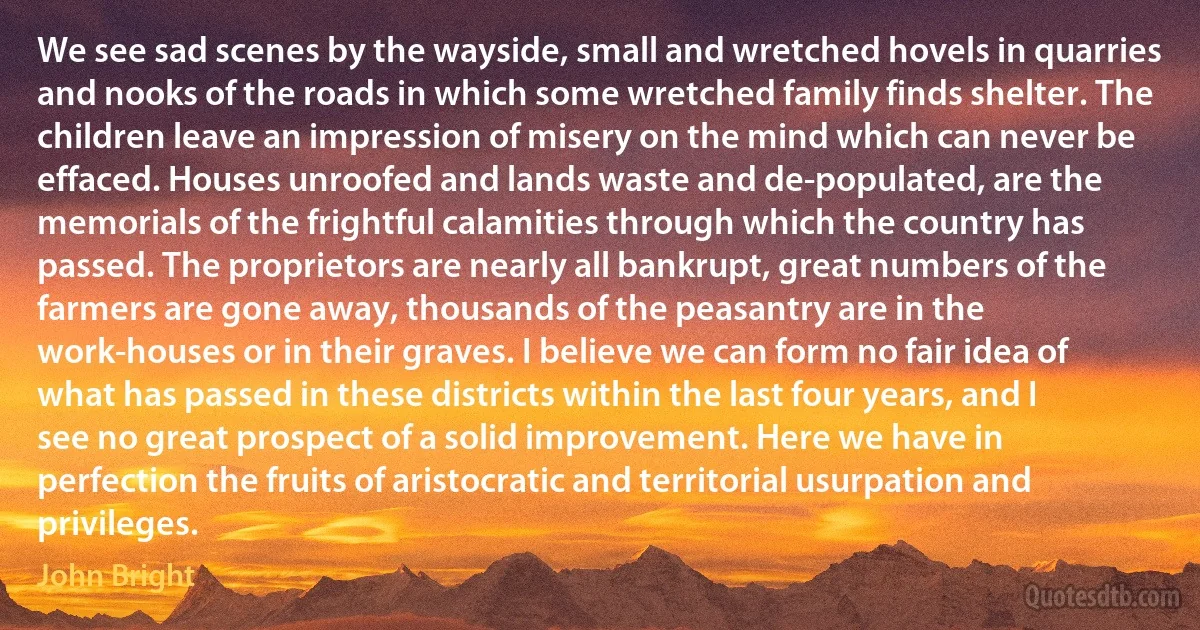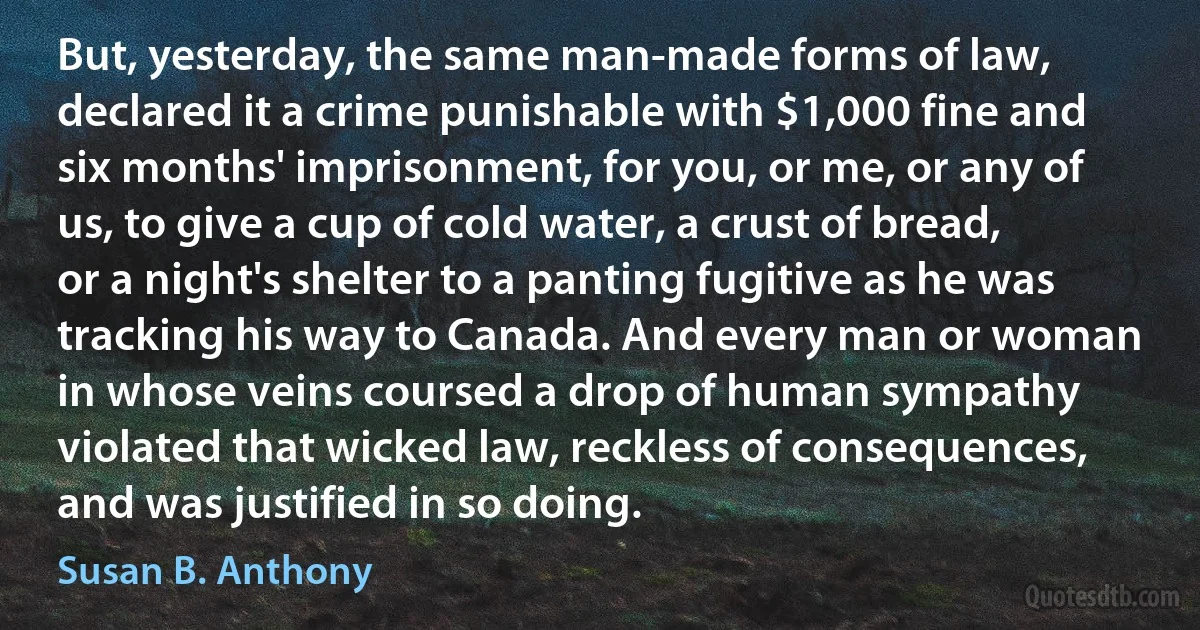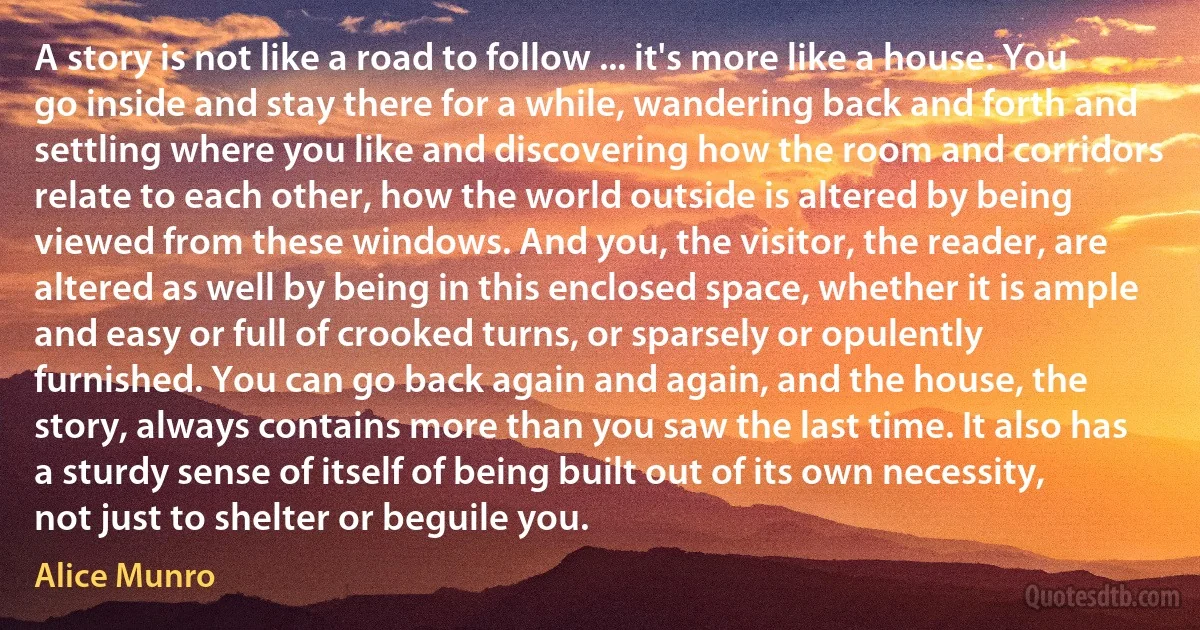Shelter Quotes - page 4
A young plant should always be protected against goats and cows and the mischief of little urchins, by means of a fence. But when it becomes a big tree, a flock of goats or a herd of cows can freely find shelter under its spreading boughs and fill their stomachs with their leaves. So when your faith is yet in its infancy, you should protect it from the evil influences of bad company. But when you grow strong in faith, no worldliness or evil inclination will dare approach your holy presence; and many who are wicked will become godly through their holy contact with you.

Ramakrishna
O Mother, I throw myself on Thy mercy; I take shelter at Thy Hallowed Feet. I do not want bodily comforts; I do not crave name and fame; I do not seek the eight occult powers. Be gracious and grant that I may have pure love for Thee, a love unsmitten by desire, untainted by any selfish ends - a love craved by the devotee for the sake of love alone. And grant me the favour, O Mother, that I may not be deluded by Thy world-bewitching māyā, that I may never be attached to the world, to "woman and gold", conjured up by Thy inscrutable māyā! O Mother, there is no one but Thee whom I mav call my own. Mother, I do not know how to worship; I am without austerity; I have neither devotion nor knowledge. Be gracious, Mother, and out of Thy infinite mercy grant me love for Thy Lotus Feet.

Ramakrishna
The change of religion in Scotland, eager and vehement as it was, raised an epidemical enthusiasm, compounded of sullen scrupulousness and warlike ferocity, which, in a people whom idleness resigned to their own thoughts, and who conversing only with each other, suffered no dilution of their zeal from the gradual influx of new opinions, was long transmitted in its full strength from the old to the young, but by trade and intercourse with England, is now visibly abating, and giving way too fast to their laxity of practice and indifference of opinion, in which men, not sufficiently instructed to find the middle point, too easily shelter themselves from rigour and constraint.

Samuel Johnson
This is the Earth - our planet, home to millions of different species, but only one species dominates everything - human beings. There are nearly seven billion of us living on the Earth, and the human population is increasing by more than two people every second; two hundred thousand people every day; nearly eighty million people every year. Each additional life needs food, energy, water, shelter, and hopefully a whole lot more. m0s0-m0s43.

David Attenborough
The duel went on for three days, but it ended in our victory in a matter of seconds. The German was well prepared for it. He had liquidated two Soviet snipers before that. But, with the help of my comrades-in-arms, also snipers whose positions were next to mine, I managed to slay him. I did not know what kind of sniper had been brought to Stalingrad, but when we pulled him out of his shelter we discovered that he was the chief of the school for snipers based in Berlin. On the whole I liquidated 242 Nazis in Stalingrad. My friends and pupils also eliminated many of them. I had trained 30 snipers who killed 1126 Nazis during the war.

Vasily Zaytsev
We took portable showers, Pampers and clothes for kids [in a Hurricane Katrina shelter]. I sang for them and played the guitar... At least for a little while, they saw that someone wasn't forgetting them. It lifted their spirits, and I knew they were a little more comfortable when we left.

Gloria Estefan
When you cut human beings down to size, we're really quite simple creatures; food, shelter, warmth, light, heat and you build it up from there really until you finally go Gucci shoes or whatever it is or whatever your consumer desires are. All those desires are ultimately, they're about gratification.

Bruce Dickinson
It is truer today than when Alfred Nobel realized it a half-century ago, that peace cannot be achieved in a vacuum. Peace must be paced by human progress. Peace is no mere matter of men fighting or not fighting. Peace, to have meaning for many who have known only suffering in both peace and war, must be translated into bread or rice, shelter, health, and education, as well as freedom and human dignity - a steadily better life. If peace is to be secure, long-suffering and long-starved, forgotten peoples of the world, the underprivileged and the undernourished, must begin to realize without delay the promise of a new day and a new life.

Ralph Bunche
What does peace mean in a world in which the combined wealth of the world's 587 billionaires exceeds the combined gross domestic product of the world's 135 poorest countries? Or when rich countries that pay farm subsidies of a billion dollars a day, try and force poor countries to drop their subsidies? What does peace mean to people in occupied Iraq, Palestine, Kashmir, Tibet and Chechnya? Or to the aboriginal people of Australia? Or the Ogoni of Nigeria? Or the Kurds in Turkey? Or the Dalits and Adivasis of India? What does peace mean to non-Muslims in Islamic countries, or to women in Iran, Saudi Arabia and Afghanistan? What does it mean to the millions who are being uprooted from their lands by dams and development projects? What does peace mean to the poor who are being actively robbed of their resources and for whom everyday life is a grim battle for water, shelter, survival and, above all, some semblance of dignity? For them, peace is war.

Arundhati Roy
If I have done anything for the colored people, it is in a great measure due to my having had the good-fortune, when I escaped from slavery, to become acquainted with William Lloyd Garrison, and with Wendell Phillips, and with our friend Oliver Johnson, and with Dr. Bowditch. The home of Dr. Bowditch, I may say, gave me the first shelter I received in this city. I have often been asked where I got my education. I have answered, from the Massachusetts Abolition University, Mr. Garrison, president... I meet with colored men on all sides smoking and sometimes drinking. That is not the way to rise in the world. For my own part, I neither smoke, nor chew tobacco nor take snuff, nor drink whiskey; and I should be delighted if I could make the same statement with regard to my whole people.

Frederick Douglass
If we would reach a degree of civilization higher and grander than any yet attained, we should welcome to our ample continent all the nations, kindreds, tongues and peoples, and as fast as they learn our language and comprehend the duties of citizenship, we should incorporate them into the American body politic. The outspread wings of the American eagle are broad enough to shelter all who are likely to come.

Frederick Douglass
I assert most unhesitatingly, that the religion of the south is a mere covering for the most horrid crimes - a justifier of the most appalling barbarity, - a sanctifier of the most hateful frauds, - and a dark shelter under which the darkest, foulest, grossest, and most infernal deeds of slaveholders find the strongest protection.

Frederick Douglass
I assert most unhesitatingly, that the religion of the South - as I have observed it and proved it - is a mere covering for the most horrid crimes; a justifier of the most appalling barbarity; a sanctifier of the most hateful frauds; and a dark shelter, under which the darkest, foulest, grossest, and most infernal abominations fester and flourish. Were I again to be reduced to the condition of A slave, next to that calamity, I should regard the fact of being the slave of a religious slaveholder, the greatest that could befall me.

Frederick Douglass
There's definitely a rule in the Convention against humiliating prisoners and I'd have to see exactly the interview to see whether that in itself violated the Convention, but the Convention is very clear that prisoners have got to be treated properly. We are treating the Iraqi prisoners extremely well. In fact I think they get good food and shelter and they're free from the horrible commanders they used to work for. I think most of them are much happier, frankly.

Paul Wolfowitz
Were the destiny of woman thus exactly marked out, did she invariably retain the shelter of a parent's or guardian's roof till she married, did marriage give her a sure home and a protector, were she never liable to be made a widow, or, if so, sure of finding immediate protection from a brother or new husband, so that she might never be forced to stand alone one moment, and were her mind given for this world only, with no faculties capable of eternal growth and infinite improvement, we would still demand of her a far wider and more generous culture than is proposed by those who so anxiously define her sphere.

Margaret Fuller
In the modern world, material is only wealth if you can get rid of it. The British miner cannot eat his coal, nor clothe his children with it, nor build his house with it. If coal is to mean for the British miner food and shelter and clothing, he must get rid of it. Get rid of it, that is, to someone who has money, sell it. But how is that someone to get money? He can only get it by one means: By getting rid of his material to someone who has money, who can only get money by getting rid of his material - round the world.

Norman Angell



